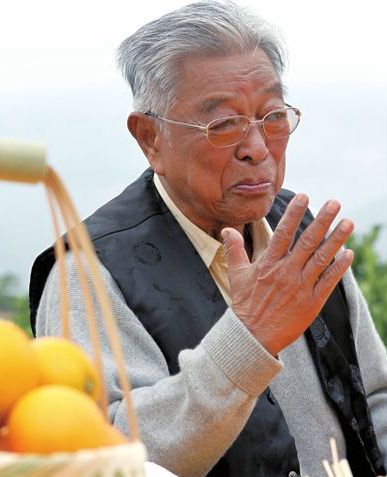Business tycoons launch fruit brands
 0 Comment(s)
0 Comment(s) Print
Print E-mail Xinhua, January 13, 2014
E-mail Xinhua, January 13, 2014
|
|
| The “Chu’s orange” is named after 85-year-old Chu Shijian, China’s former “tobacco king” who built a struggling tobacco firm into the country’s largest and most profitable cigarette producer in the 1980s. [file photo] |
A unique orange brand has become one of the most coveted fruits in China this winter, even though it costs five times the average market price.
"It"s not just because the fruit are exceptionally sweet and juicy," said Shi Jin, an office worker in Shijiazhuang, capital of northern Hebei Province.
"The brand has a big story behind it."
The "Chu"s orange" is named after 85-year-old Chu Shijian, China"s former "tobacco king" who built a struggling tobacco firm into the country"s largest and most profitable cigarette producer in the 1980s. Chu, however, was jailed for life on corruption charges in 1998.
After he was released on medical parole in 2002, Chu started growing oranges in 160 hectares of land in the mountains of southwest China"s Yunnan Province.
Today, his fruit farm produces 8,000 tons of oranges a year, generating 30 million yuan (US$ 4.95 million) in annual profits. Most of Chu"s oranges are sold online.
"These are not ordinary oranges. Each fruit carries Chu"s story of perseverance," said Shi. "So the fruit are not just delicious, but inspiring too."
Chu is not the only business tycoon to take up farming in China. Several other big-name business leaders have chosen to show agricultural prowess.
Real estate tycoon Pan Shiyi has launched "Pan"s apples," a sweet, juicy apple grown in northwest China"s Gansu Province. They cost 30 yuan per kg — six times the average apple price — but sell well online.
Meanwhile, Liu Chuanzhi, founder of the Lenovo Group, China"s PC giant, is soon to launch a quality kiwi fruit brand, a major product of Lenovo"s new agricultural arm. It will be cost 56 yuan per kg.
When his company"s agricultural arm was set up last year, Liu said he was optimistic about the new business, as more Chinese consumers were willing to pay a higher price for better quality and safer food amid growing food safety concerns.
He was echoed by Liu Shanshan, a 30-year-old Beijing white-collar worker. "The names of these business tycoons in the brand names, increase consumers" confidence of their quality. That"s why I buy expensive fruit on the web instead of the cheaper ones sold at neighborhood stores."
Most avid buyers of "tycoon brand" fruits are in their 20s and 30s.
"My parents, complain the fruit are too expensive and are not worth the price," said Liu.
"It"s hard to explain the brand story to their generation who always try to be thrifty."







Go to Forum >>0 Comment(s)